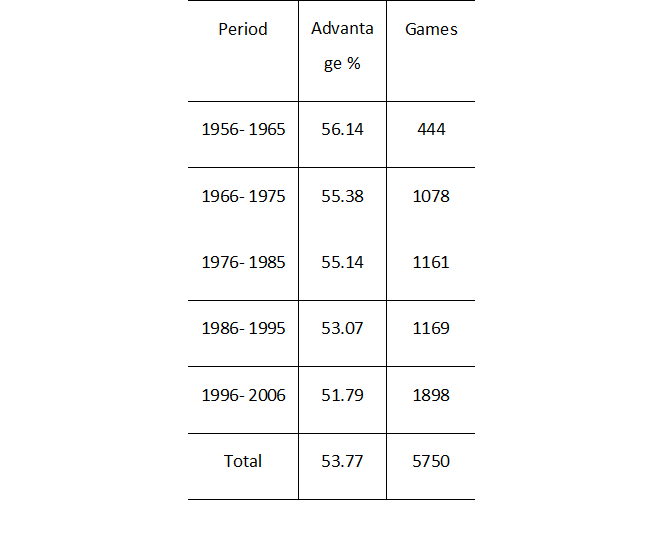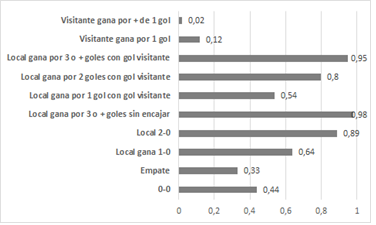February 8, 2022
Football
What is a good result in the first leg of the knock-out stage? The advantage of playing the second leg home
The same question comes up when approaching the end of the season and the knock-out stage starts to decide which team goes to the next round. Is it better to play the second leg home? Some coaches and players do prefer this. They think it is easier to change a bad result when being supported by the spectators. Others prefer playing home first to get a positive result that makes them feel confident for the second leg.
Research carried out on this topic show that there is an advantage when playing the second leg home during the knock-out stage (second leg home advantage effect). 1,2 Even though it is true that playing home is advantageous in the first and second leg, the effect is greater when the team plays the second leg supported by their fans. The following table shows the advantage of playing the second leg home after analysing the knock-out stage of the Champions League, the UEFA Cup (now known as the Europa League) and the Europa Super Cup from 1955 to 2006. 3 A 50% value would mean that there is no advantage for playing home. On the contrary, the closer it is to 100%, the greater is the advantage. As we can see, there is a slight advantage when playing the second leg home. Besides, we can observe how that effect has become weaker as time goes by.

There are many possible reasons for explaining this effect: 4
- Referee bias may lead referee to benefit the local team when there is an important game.
- The different tactics used by players and coaches in the second leg compared to the first one which make teams have a more defensive behaviour when playing away and a more offensive one when playing home.
- The players’ motivation. Being more committed and focused on the second leg may lead to a better performance.
- Another possible explanation about the players’ motivation may be that in the first leg both teams try to get the best performance. However, in the second leg each team has a very specific aim that has been set based on the first leg result.
However, there are other two key factors to properly estimate the advantage of playing the second leg home: the difference in the level of the teams and the scoreboard of the first game. Playing the second leg home increases between a 4% to 10% the probability of qualifying when the difference in the level of the teams is too big or too small, respectively.5 This means, playing the second leg home or away can be decisive when the opponents have similar levels and less relevant when a team is much better than the other.
Besides, the scoreboard of the first leg is determining. Figure 1 shows the probability of qualifying for the team which plays the first leg home based on the scoreboard.6 The estimation is made on the base that both teams have similar levels. If the team which plays home wins the first leg by scoring 3 or more goals, and the opponent does not score any goal, they have a 98% probability of qualifying. On the contrary, the probability of going to the next round is reduced to 2% if the team which plays away wins the first leg by making a difference of more than one goal.
The practical applications suggest that teams should set clear objectives in the first leg game (reaching a particular percentage of ball possession, stealing a minimum number of balls in a specific area of the field, etc.) instead of just trying hard to win it. Scoring a goal when the team is meeting the set objectives should not change the game plan. Doing what has led to the temporary success is what is recommended. We should avoid giving the apparently knocked out opponent the opportunity to go further. For teams playing away, the presence of their supporters may be a good way of reducing the local team advantage. Practically all can be trained in football. It is necessary to analyse the effect of the recent removal of the rule of the double value of goals scored when playing away in the competitions organised by UEFA.

References:
1 Lago Peñas, C. & Gómez, M. (2020). El jugador número 12. La ventaja de jugar en casa en el fútbol. Authors’ Edition.
2 Gómez, M., Pollard, R. & Lago-Peñas, C. (2021). Home Advantage in Sport. Causes and the Effect on Performance. London: Routledge.
3 Page, L. & Page, K. (2007). The second leg home advantage: Evidence from European football cup competitions. Journal of Sports Sciences, 25(14): 1547−1556.
4 Lidor, R.; Bar-Eli, M.; Arnon, M. and Bar-Eli, A. (2010). On the advantage of playing the secind game at home in the knock out stages of European soccer cup competitions. International Journal of Sport and Exercise. 8(3): 312- 325.
5 Del Corral, J.; Varela-Quintana, C. & Prieto-Rodríguez, J. (2015). Where to play (Away or Home) in a Best-of-2 Tournament? An analysis from UEFA Competitions. In The Economics of Competitive Sports. Editors: Ruud Koning, Plácido Rodríguez, Stefan Kèsenne. Edward Elgar Publishing.
6 Flores, R.; Forrest, D.; de Pablo, C. & Tena, J.D. (2015). What is a good result in the first leg of a two-legged football match? European journal of Operational Research, 247: 641−647.
KNOW MORE
CATEGORY: MARKETING, COMMUNICATION AND MANAGEMENT
This model looks to the future with the requirements and demands of a new era of stadiums, directed toward improving and fulfilling the experiences of fans and spectators, remembering “feeling” and “passion” when designing their business model.
CATEGORY: FOOTBALL SPORTS PERFORMANCE
Through the use of computer vision we can identify some shortcomings in the body orientation of players in different game situations.
CATEGORY: MEDICINE HEALTH AND WELLNESS
A health check must detect situations which, despite not showing obvious symptoms, may endanger athletes subject to the highest demands.
CATEGORY: FOOTBALL TEAM SPORTS
In the words of Johan Cruyff, “Players, in reality, have the ball for 3 minutes, on average. So, the most important thing is: what do you do during those 87 minutes when you do not have the ball? That is what determines whether you’re a good player or not.”
CATEGORY: MEDICINE HEALTH AND WELLNESS SPORTS PERFORMANCE
Muscle injuries account for more than 30% of all injuries in sports like soccer. Their significance is therefore enormous in terms of training sessions and lost game time.
DO YOU WANT TO KNOW MORE?
- SUBSCRIBE
- CONTACT
- APPLY
KEEP UP TO DATE WITH OUR NEWS
Do you have any questions about Barça Universitas?
- Startup
- Research Center
- Corporate